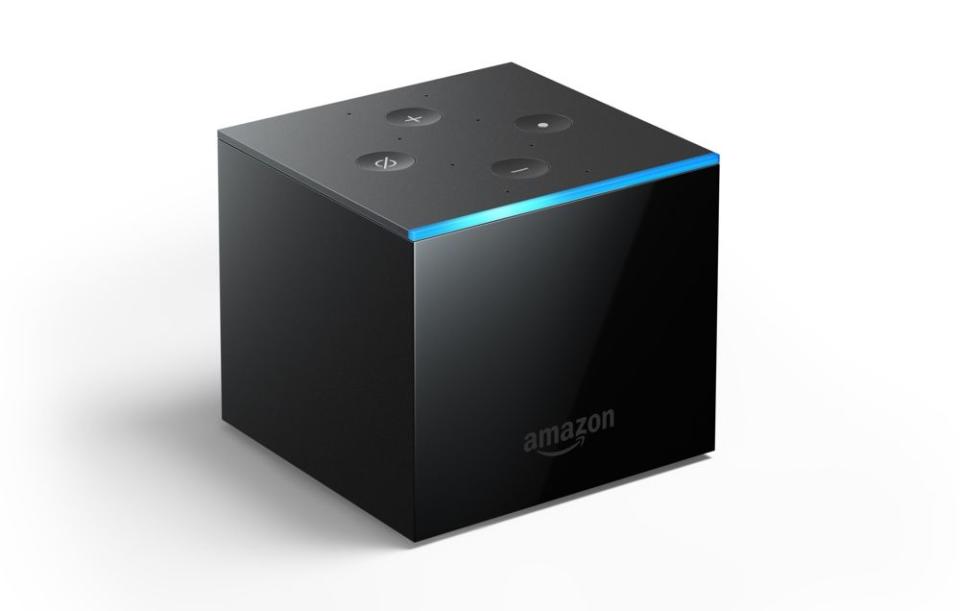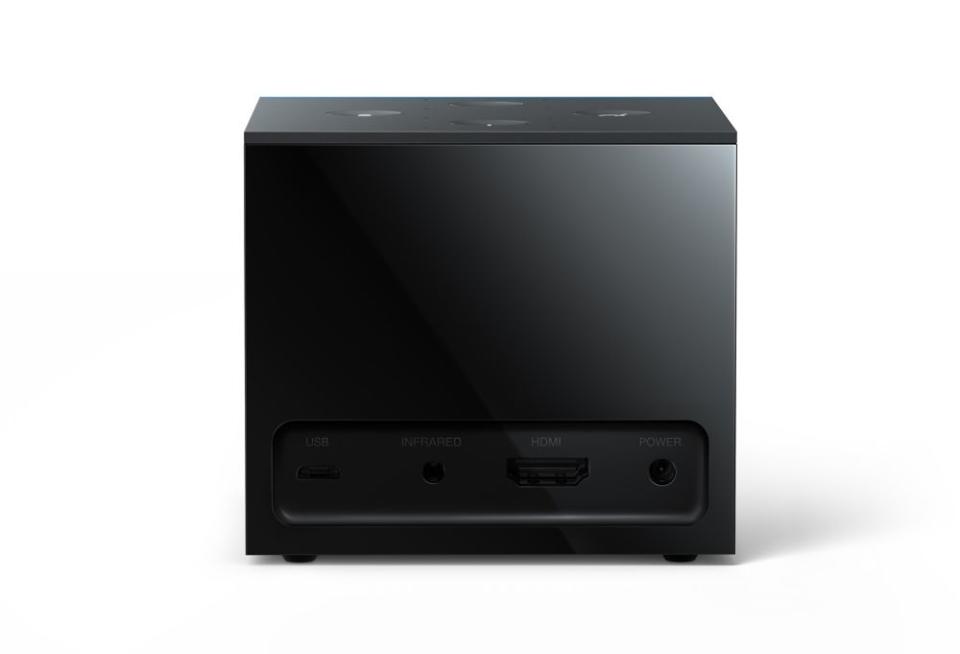Amazon Fire TV Cube review: Now it's okay to talk to your TV
Amazon’s (AMZN) Fire TV Cube is what happens when a company takes two great ideas and asks, “What if we just smashed these together?” And as it turns out, that’s also a great idea. At least in the case of the Cube.
Available Thursday, June 21, Amazon’s Fire TV Cube brings you the best of the Amazon Echo and Fire TV — letting you control your smart home devices, get news updates, check the weather and more with Alexa. At the same time, the 4K, HDR-capable Cube lets you binge your favorite shows on Netflix, Hulu and any other number of services.
And it does all of that for $119, making the Fire TV Cube less expensive than the $229 Echo Show and $129 Echo Spot, while offering more functionality than both. In other words, if you’ve been looking to buy a Fire TV or Echo, the Fire TV Cube is a no-brainer.
Welcome to the Cube
Amazon’s Cube isn’t exactly a Cube. It’s more of a glossy black rectangle. Still, I’m willing to forgive the tech giant for that. Unlike Amazon’s cylindrical Echo, the Cube’s blue indicator light is only visible along its top, front edge. Amazon says that’s because the Cube is meant to face one direction, toward you. So putting the indicator on the back or sides would be unnecessary. It could also cast a light on your TV, which would be incredibly annoying.
When you’re using Alexa and your TV is on, the indicator light will appear both on the Cube and at the top of your television screen, which helps if you’re lying down and can’t see the Cube over the piles of soda cans and random nonsense on your coffee table. Not that I know that from experience or anything.

During setup Amazon will repeatedly remind you to make sure the Fire TV Cube is about a foot away from your speaker to ensure its microphones can pick up what you’re saying even when you’re listening to “The Bachelorette” at full volume.
Amazon includes pretty much everything you need in the box including an IR extender and ethernet adapter. The one thing the company skimps on, though, is an HDMI cable, which is just ridiculous.
Talking to your TV
What makes owning a Cube better than simply connecting your Echo to your existing Fire TV, besides that fact that it’s cheaper than buying both, is that the Cube allows you to control your television and connected accessories in addition to certain apps.
For instance, say your TV and soundbar are off, but you want to switch them on and watch the New York Mets bludgeon the very concept of baseball to death. Instead of turning on your TV with your remote, then turning on your soundbar with another remote and, finally, flipping to the game, you can say, “Alexa, turn on the TV and tune to channel 62,” and the Cube will switch on your set and start broadcasting the waking nightmare that is Mets baseball.
When the TV is off, the Cube handles speaker duty, but when your set is on, it takes over audio output. This way, if you’re using your PlayStation and want to switch back to the Cube, you can still hear Alexa confirm your request. It also means you can still listen to music, use skills, get your flash briefing or activate smart home devices without having to also turn on your TV.

Amazon built a number of impressive voice controls into the Cube beyond just turning on your TV and soundbar. You can also ask Alexa to change outputs, or, if you’ve renamed them, ask the assistant to switch to your PlayStation (SNE) or Xbox (MSFT). You can also control videos by telling Alexa to fast forward or rewind, and switch to specific apps. I ran into some trouble with these commands, though, especially rewind and fast forward, but Amazon says it’s always improving its products.
Amazon said it wanted to essentially let users control their Cube with just their voice, and the company has largely accomplished that goal. If you’re on the Home screen, for example, you can say, “Alexa, show me more,” and the voice assistant will scroll to reveal additional apps.
The Cube’s menu also changes when you use your voice, adding numbers to each selection so you can say, “Alexa, select number 1,” to choose an app or show. It’s not necessarily the fastest way to do things. I still prefer to use the included remote to scroll through menus since it’s faster. But it’s helpful knowing that if I misplace my clicker, I can still get to Netflix without having to download the awful Fire TV remote app for my phone.
I’m also not a huge fan of using Alexa to turn up the volume on my TV, since it moves in such small increments, and requires that you ask the assistant to pump up the audio several times. If Amazon lets you change the volume to a specific level, it would be much more useful. Rewinding TV shows and videos was equally slow, and at times didn’t seem to work quite well. Thankfully, the software I tested on the Cube isn’t the final retail version, and should be updated to address any issues.
Since the Cube is also an Echo, it pretty much provides the same utility as the Echo Show. Ask it what the weather is like, and you’ll see the weather forecast on your TV just like the Show. Listen to music, and your television will display the album art and lyrics. Check sports scores, your flash briefing or play “Jeopardy” and, you guessed it, they will all show up on your TV.
And since the Echo Show is still $229, the Cube pretty much makes it obsolete. At this point, the only reason to own a Show is if you don’t have a TV in the room you want to keep it in.
Should you get it?
Amazon’s Fire TV Cube is an easy purchase for anyone looking for an Echo or Fire TV. The Cube offers virtually all of the Echo’s features with the added abilities of a Fire TV. You’d be silly not to pick up the Cube rather than a regular Echo or Fire TV. The only time I’d say you should skip the Cube is if you’ve already got a perfectly fine Fire TV and have no interest in owning an Echo.
For, everyone else, the Fire TV Cube is an impressive device that’s worth picking up. Just make sure you buy an HDMI cable too.
More from Dan:
Email Daniel Howley at [email protected]; follow him on Twitter at @DanielHowley. Follow Yahoo Finance on Facebook, Twitter, Instagram, and LinkedIn
